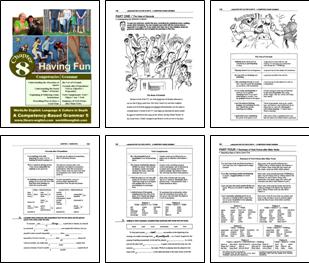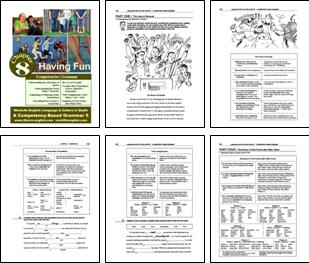1
/
of
1
Work/Life English
D-11.11 Define, Classify & Utilize Gerunds, Other Verbals & Verb Complements
D-11.11 Define, Classify & Utilize Gerunds, Other Verbals & Verb Complements
Regular price
$4.00 USD
Regular price
Sale price
$4.00 USD
Unit price
/
per
Parts One-Four of Chapter 8 (“Having Fun”) of WorkLife English Grammar 5: Language & Culture in Depth, pages 145-162
18 pages
Who It’s For: (Teachers & Helpers of) Advancing Language Polishers Who Want to Know About & Compare Verbals (Gerunds vs. infinitives) + Verb Complements
Why It’s Useful: A verbal is a verb form that functions as either a noun, an adjective, or an adverb; Participles, Gerunds, and Infinitives are the main verbal types. A Verb Complement is a Base Verb, an Infinitive, or a Gerund that follows certain Main Verbs, “completing” their meanings; there may or may not be a noun or pronoun functioning as both the Object of the Main verb and the Subject of the secondary one.
In the contexts of “Sports, Parties, & Games,” here’s a whole Chapter that outlines “The Uses of Gerunds,” works with –ing Verbs after Verbs or Adjectives + Prepositions, and explains / illustrates how three verb forms (Base, to Verb, Verb-ing) can come after (the objects of) specified Causatives or Verbs of Perception (ask, help, tell; have, let, see, etc.). As usual, Explanations with Examples (+ Verb Vocabulary), motivating Exercises in various formats, and competency-assessing Activities do a credible instructional job. See if you can do one yourself!
What You’ll Do:
[1] In the pages 146-147 Part One Anecdote to Correct, “Understanding the Attraction of Team Sports: The Rules of Football,” test your grasp of “the Uses of Gerunds” by rewriting it (and checking your corrections against the original). In Exercises A-*D, arrange, adjust, and/or insert sentence elements.
[2] Starting on pages 151-152, do the same with the Part Two Narrative, “Understanding the Social ‘Rules’ or Parties: Party Customs.” Then use its practice sections to learn about and use “Gerunds after Prepositions.” The Part Three Story, “Explaining & following Game Instructions: The Scavenger Hunt,” is analogous, so follow comparable steps to take in and put out “Verb Complements.”
[3] Finally, in Part Four on pages 160-161, summarize and display what you’ve accomplished by “Describing Ways to Have a Good Time” with “Verb Forms after Main Verbs” and other relevant sentence structuring. Continue building confidence in your mastery of advanced verb-related grammar.
Couldn't load pickup availability


